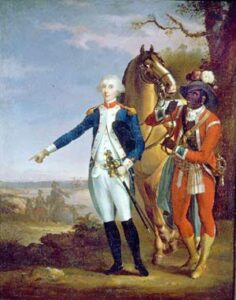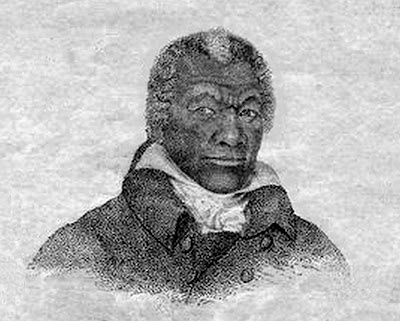
James Armistead Lafayette (December 10, 1760–August 9, 1830) was the first African American double spy. An African American slave, Armistead was owned by William Armistead in Virginia during the American Revolution
He was an African American slave in Virginia, Armistead who sought and received permission from his master, William Armistead, to enlist under Gen. Marquis de Lafayette, a French officer who joined George Washington’s Continental army during the American Revolution.
Lafayette was seeking men to spy on British general Cornwallis and his army at Yorktown, Va. Impressed with Armistead’s intelligence, Lafayette had Armistead pose as a laborer looking for work. He was hired at Cornwallis’s camp and was able to relay information about Cornwallis’s plans to Lafayette. Armistead also earned the trust of Cornwallis, who asked him to spy on the Americans. As a double agent, Armistead was able to move freely between both camps.
He provided Lafayette with critical information that enabled the general to intercept Cornwallis’s much-needed naval support and ultimately defeat Cornwallis at Yorktown in Oct. 1781, the decisive battle that ended the Revolution.
In 1781, after getting his master’s consent, Armistead volunteered to join the army under Lafayette. He utilized him as a spy, posing as a runaway slave. He joined the camp of Brigadier General Benedict Arnold, the turncoat who was leading some British forces in the area. Pretending to be a spy for them allowed Armistead to gain Arnold’s confidence to the extent that Arnold used him to guide British troops through local roads.
“The ex-slave, who later renamed himself James Armistead Lafayette in the general’s honor, served as a double agent against the British under the avowedly antislavery Lafayette.”
After Arnold departed north in the spring of 1781, James went to the camp of Lord Charles Cornwallis and continued his work. He moved frequently between British camps, where the officers would speak openly about their strategies in front of him. Armistead documented this information in written reports, which he then delivered to other American spies. In this way, he relayed much information about the British’s plans for troop deployment and their arms. The intelligence reports from his espionage were instrumental in helping defeat the British during the Battle of Yorktown.
Although Virginia passed a manumission act in 1782 allowing for the freedom of any slave by his or her owner, James Armistead remained the property of William Armistead. This was because a 1783 law specifically at freed slaves whose owners had used them as substitutes for army service in exchange for their liberty. This was not the case for Armistead due to being a spy and not a soldier.
However, in 1786, with the support of William Armistead – then a member of the House of Delegates – and a 1784 testimonial of his service from the Marquis de Lafayette, James petitioned the Virginia Assembly for his freedom. On January 9, 1787, the Assembly granted the petition. At that time, he chose to add “Lafayette” to his name to honor the general.
Armistead continued to live in New Kent County with his new wife, one son, and several other children. He became a rich farmer and at one point owned three slaves. In 1818, he applied to the state legislature for financial aid; he was granted $60 for present relief and a $40 annual pension for his services in the Revolutionary War.




